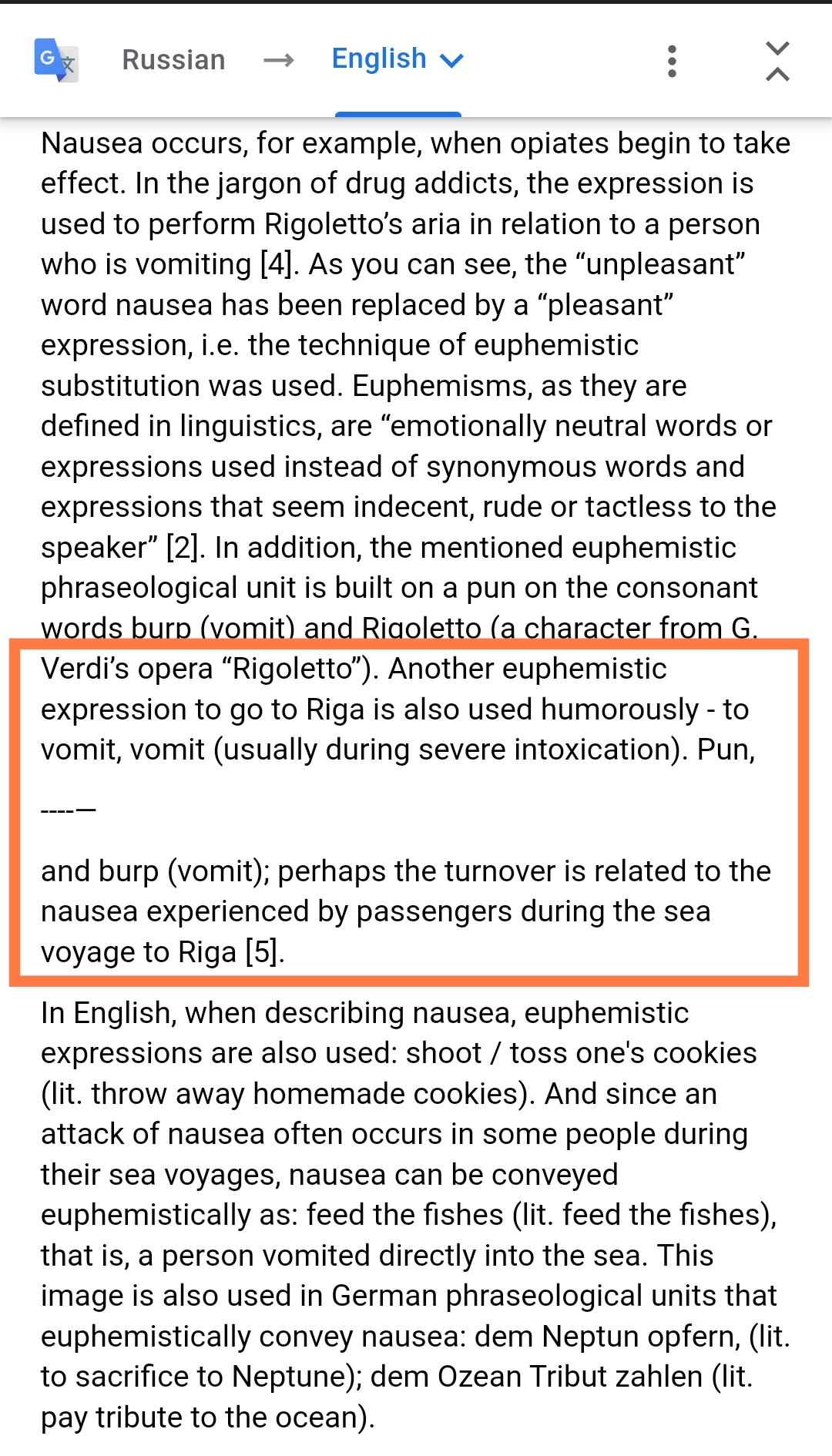It’s also possible it’s a hopelessly dated and archaic idiom that no modern speaker would recognize but was still fairly popular when that language course was first written, or something. It only takes a decade or two for a phrase to disappear from common usage sometimes.
Or maybe (since it references “czarist times” the phrase was already crazy dated and old but the Russian-speaking Englishman who wrote the course saw the phrase somewhere, thought it was funny, and so put it in. Wouldn’t put that past this world of ours either.
By the way, the Riga sounds like “Ryga” in Belarusian. So this idiom should not have been outdated. Just a bit artificial. But to be artificial is okay if you want to avoid direct naming of unpleasant things. I believe that “travel to Riga”=“poyekhal rygat’”=“go puke” is a meme for a lot of native Russians around Saint Petersburg.
It’s totally ok that some teacher include that meme into their course.
This is totally recognizable for a native speaker (like for me in my late thirties).
You will be really surprised how many local silly names exist for menstruation. “Red day of the calendar” - allusion on communist holidays. “Red army arrival day” - no explanation is needed. “Relatives from Krasnodar just come” - Krasnodar is literally “Red Gift”, so it’s obvious again. “The critical days”, “these days of the calendar”… I’ve heard all these variants in the wild by my own ears.
Oh I wasn’t by any means intending to cast shade. I was just speculating on possibilities, from the phrase being more popular inland to the phrase being unheard-of for various reasons.
I don’t speak Russian and have never been closer to Russia than Prijedor or Zagreb, so I am by no means an authority and I’m not trying to contradict anyone.
No problem, I’m glad to have such a great discussion!
By the way, English teachers in slavic countries like to teach very old phrases/memes. Like “raining cats and dogs” for the heavy rain, “wet blanket” for a grinch person. Also they can trying to tell something about cockney (which will never help students in real life)
So it’s no wonder that some virtually non-existent russian memes could go into textbooks. But the “go to Riga” is not completely dead yet. Need to wait for a decade or two :)
In Russian “to throw up” sounds like "rygat’ ". So the story and the usage looks plausible (especially for some of Sant Petersburg folks).
It’s also possible it’s a hopelessly dated and archaic idiom that no modern speaker would recognize but was still fairly popular when that language course was first written, or something. It only takes a decade or two for a phrase to disappear from common usage sometimes.
Or maybe (since it references “czarist times” the phrase was already crazy dated and old but the Russian-speaking Englishman who wrote the course saw the phrase somewhere, thought it was funny, and so put it in. Wouldn’t put that past this world of ours either.
By the way, the Riga sounds like “Ryga” in Belarusian. So this idiom should not have been outdated. Just a bit artificial. But to be artificial is okay if you want to avoid direct naming of unpleasant things. I believe that “travel to Riga”=“poyekhal rygat’”=“go puke” is a meme for a lot of native Russians around Saint Petersburg.
It’s totally ok that some teacher include that meme into their course. This is totally recognizable for a native speaker (like for me in my late thirties).
You will be really surprised how many local silly names exist for menstruation. “Red day of the calendar” - allusion on communist holidays. “Red army arrival day” - no explanation is needed. “Relatives from Krasnodar just come” - Krasnodar is literally “Red Gift”, so it’s obvious again. “The critical days”, “these days of the calendar”… I’ve heard all these variants in the wild by my own ears.
P.S accidentally found an independent confirmation regarding Riga https://translate.google.com/?sl=auto&tl=en&text=https%3A%2F%2Fcyberleninka.ru%2Farticle%2Fn%2Fbolezni-i-ih-frazeologicheskie-evfemisticheskie-nominatsii-v-russkom-angliyskom-nemetskom-frantsuzskom-yazykah &op=translate
Oh I wasn’t by any means intending to cast shade. I was just speculating on possibilities, from the phrase being more popular inland to the phrase being unheard-of for various reasons.
I don’t speak Russian and have never been closer to Russia than Prijedor or Zagreb, so I am by no means an authority and I’m not trying to contradict anyone.
No problem, I’m glad to have such a great discussion! By the way, English teachers in slavic countries like to teach very old phrases/memes. Like “raining cats and dogs” for the heavy rain, “wet blanket” for a grinch person. Also they can trying to tell something about cockney (which will never help students in real life) So it’s no wonder that some virtually non-existent russian memes could go into textbooks. But the “go to Riga” is not completely dead yet. Need to wait for a decade or two :)